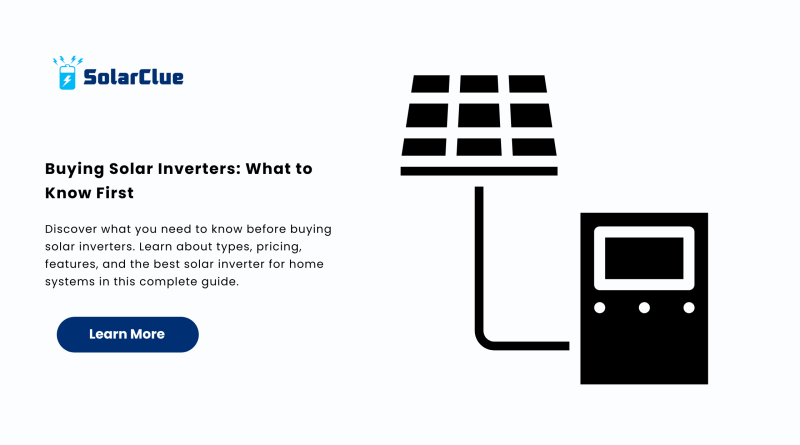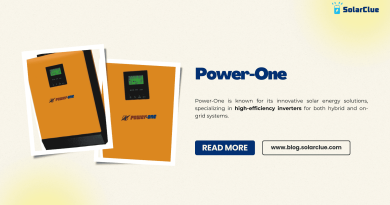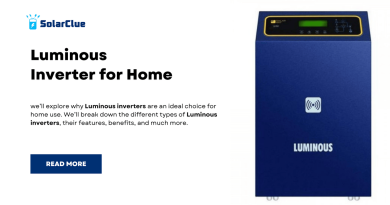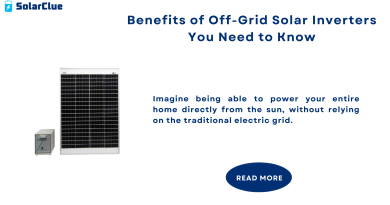Buying Solar Inverters: What to Know First
Are you planning to switch to clean energy and confused about which solar inverter is right for your home or business? With the increasing demand for renewable energy, choosing the right inverter has never been more important. A well-selected solar inverter ensures optimal energy conversion, safety, and long-term savings. In this guide, we’ll break down the essential things to know before buying, helping you make a confident and informed investment in your solar power system.
Table of Contents
- 1 Why Solar Inverters Matter in Any Solar Power System
- 2 Types of Solar Inverters: Which One Do You Need?
- 3 Key Factors to Consider Before Buying a Solar Inverter
- 4 Solar Inverter for Home: What Makes a Good Choice?
- 5 Understanding Solar Inverter Price Trends
- 6 Leading Brands in the Solar Inverter Market
- 7 Common Mistakes to Avoid When Buying Solar Inverters
- 8 Is It Better to Buy Online or Offline?
- 9 Solar Inverter Installation Tips
- 10 Can You Upgrade Your Solar Inverter Later?
- 11 Maintenance Tips to Prolong Inverter Life
- 12 How Long Do Solar Inverters Last?
- 13 Solar Inverter vs Battery Inverter: What’s the Difference?
- 14 When Should You Replace a Solar Inverter?
- 15 The Future of Solar Inverters in India
- 16 Conclusion
- 17 FAQs
Why Solar Inverters Matter in Any Solar Power System
A solar inverter is the heart of any solar power system. It converts the DC electricity generated by solar panels into AC power, which your appliances use. Without this essential device, solar panels alone can’t power your home or business.
Types of Solar Inverters: Which One Do You Need?
Understanding the types of solar inverters available helps you make a smarter purchase:
1. String Inverters
Ideal for large installations with uniform sunlight exposure. Cost-effective and reliable.
2. Microinverters
Attached to individual panels. Best for rooftops with shade or different orientations.
3. Hybrid Inverters
Combine the benefits of a solar inverter with a battery inverter. Perfect for those planning to install energy storage later.
4. Central Inverters
Used in utility-scale commercial installations.
Key Factors to Consider Before Buying a Solar Inverter
Before making a purchase, consider the following crucial points:
Efficiency Ratings
A good solar inverter should have an efficiency of 95% or higher. This means less power is lost in the conversion process.
Compatibility with Solar Panels
Ensure that the inverter supports the voltage and wattage of your current or planned solar panel system.
Warranty Period
Longer warranties (10-15 years) usually reflect better quality.
Safety Features
Look for models with in-built surge protection, ground fault protection, and anti-islanding protection.
Solar Inverter for Home: What Makes a Good Choice?
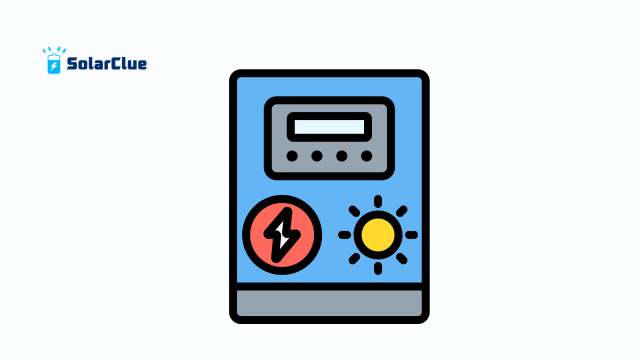
When buying a solar inverter for home, opt for models that are compact, quiet, and feature-rich. Look for remote monitoring features, smart app support, and built-in Wi-Fi for real-time performance tracking.
Understanding Solar Inverter Price Trends
The solar inverter price varies based on brand, type, and capacity:
- String Inverters: ₹15,000 – ₹35,000
- Microinverters: ₹5,000 – ₹10,000 per panel
- Hybrid Inverters: ₹40,000 – ₹90,000
You can explore the latest prices and offerings at solarclue.com.
Leading Brands in the Solar Inverter Market
Some top-rated inverter brands in India include:
- Luminous
- Sungrow
- Growatt
- GoodWe
- SMA
- Delta
Make sure to check reviews and performance benchmarks before selecting a brand.
Common Mistakes to Avoid When Buying Solar Inverters
- Ignoring system compatibility
- Overpaying for unnecessary features
- Choosing size without calculating actual load
- Forgetting to consider installation support and after-sales service
Is It Better to Buy Online or Offline?
Online platforms often provide competitive solar inverter price options and product comparisons. For expert insights and guides, don’t forget to visit blog.solarclue.com.
Solar Inverter Installation Tips
Hiring a certified installer is key. A professional ensures:
- Proper wiring and grounding
- Safe placement for ventilation
- Integration with net metering, if required
Can You Upgrade Your Solar Inverter Later?
Yes. Many modern solar inverters are modular, allowing for future expansion or upgrades to hybrid systems.
Maintenance Tips to Prolong Inverter Life
- Keep the inverter clean and dust-free
- Regularly check performance stats
- Conduct annual professional inspections
How Long Do Solar Inverters Last?
Typically, solar inverters last between 10–15 years, though premium models can last up to 20 years with proper care.
Solar Inverter vs Battery Inverter: What’s the Difference?
A solar inverter converts solar energy; a battery inverter manages stored power from batteries. A hybrid inverter combines both roles, ideal for uninterrupted power supply.
When Should You Replace a Solar Inverter?
- Frequent shutdowns or errors
- Reduced energy conversion efficiency
- Noise or overheating
The Future of Solar Inverters in India
With increased government incentives and rising electricity costs, the solar market is booming. Innovations like AI-based performance optimization and blockchain for energy tracking are on the horizon.
Conclusion
Buying the right solar inverter ensures long-term savings, system performance, and energy independence. Make an informed decision by evaluating the right type, features, and solar inverter price that fits your specific energy needs.
For more expert guides and product deals, don’t forget to visit solarclue.com and our resource hub at blog.solarclue.com—your go-to destination for everything solar!
FAQs
1. What size solar inverter do I need for home use?
It depends on your daily electricity consumption. Typically, a 3kW–5kW solar inverter for home is sufficient for average households.
2. Are hybrid solar inverters worth the investment?
Yes, especially if you plan to use battery storage or want backup during power outages.
3. How do I know if my inverter is working efficiently?
Most inverters come with an app or display showing performance. Any drop in efficiency or output should be checked.
4. Can I install a solar inverter myself?
It’s not recommended unless you are certified. Improper installation can lead to hazards and warranty voids.
5. How do I choose between string and microinverters?
Use microinverters for shaded or complex roofs. String inverters work best on simple, sun-exposed installations.
Explore India’s trusted solar platform today at solarclue.com—your future of energy begins here!

